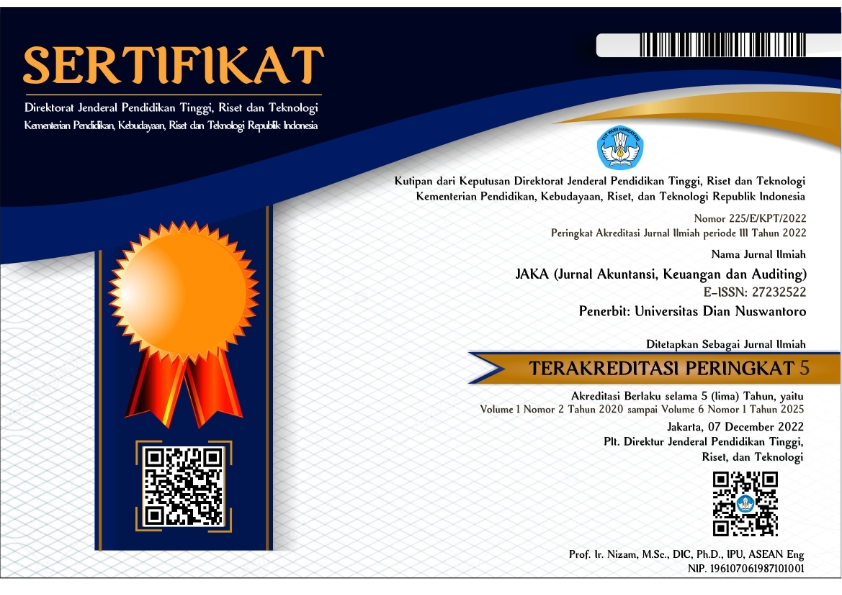Pengaruh Nilai Tukar, Inflasi, Suku Bunga Bi Dan Dow Jones Index Terhadap Indeks Harga Saham Gabungan Di Bursa Efek Indonesia Periode 2018-2022
DOI:
https://doi.org/10.56696/jaka.v5i1.10879Abstract
The development of financial asset investment in the capital market is growing quite rapidly, starting from the ease of making sales and purchases but also the low capital required to start investing in the capital market. However, in the capital market, especially the stock exchange, it is an investment instrument that has a high risk and high return, so investors must be selective in determining which share issuer to buy by considering factors that can influence share prices on the Indonesian Stock Exchange. Some of them include exchange rates, inflation, BI interest rates and the Dow Jones index. Therefore, this research was carried out to analyze the influence of exchange rates, inflation, BI interest rates and the Dow Jones index on the composite stock price index in 2018-2022 with the data used being a monthly time series with a sample size of 60 months. This research uses a quantitative approach with the analytical techniques used in this research, namely descriptive statistical analysis, classical assumption tests and multiple linear regression tests which were processed using the E-Views version 12 program. With results showing that the exchange rate has a significant negative effect on the stock price index combined, then for inflation, BI interest rates and the Dow Jones index there is a partially significant positive influence on the composite stock price index on the Indonesia Stock Exchange.References
Andi, D., & Dzikri, M. S. (2018). Potensi laba saham masih nomor satu. Kontan.Co.Id. https://investasi.kontan.co.id/news/potensi-laba-saham-masih-nomor-satu
Edi Murdiyanto, S. H. M. M., & Miladiah Kusumaningarti, S. E. M. M. A. (2020). Analisis Investasi Dan Manajemen Portofolio Pasar Modal Indonesia. Jakad Media Publishing.
Fitri, K., Ekonomi, F., Bisnis, D., & Riau, U. M. (2022). Pengaruh Tingkat Inflasi, Nilai Tukar (Kurs) dan Suku Bunga Terhadap IHSG di Bursa Efek Indonesia Periode 2016-2020. In Economics, Accounting and Business Journal (Vol. 2, Issue 1). www.finance.yahoo.com
Fitriani, W. N., Rapini, T., & Sumarsono, H. (2020). Pengaruh Tingkat Suku Bunga, Inflasi dan Indeks Dow Jones terhadap Indeks Harga Saham Gabungan Di BEI Tahun 2014-2018. Jurnal Ekonomi, Manajemen Dan Akuntansi, 4(2), 252–265. https://doi.org/10.24269/iso.v4i2.491
Gojali, D. I., Juniwati, E. H., & Pratiwi, L. N. (2021). Pengaruh Jub Arti Sempit (M1), BI Rate, Inflasi, dan Kurs Terhadap IHSG di Bursa Efek Indonesia. Indonesian Journal of Economics and Management, 1(3), 561–577. https://doi.org/10.35313/ijem.v1i3.3019
Ismanto, H., & Pebruary, S. (2021). Aplikasi SPSS Dan Eviews Dalam Analisis Data Penelitian. Deepublish.
Kurniawati, & Khairunnisa. (2020). Analisis Faktor Makroekonomi yang Berpengaruh terhadap Indeks Harga Saham Gabungan ( IHSG ) Tahun 2010-2018. Jurnal Ilmiah MEA (Manajemen, Ekonomi, Dan Akuntansi), 4(3), 2010–2018.
Nugraha, B. (2022). Pengembangan Uji Statistik: Implementasi Metode Regresi Linier Berganda dengan Pertimbangan Uji Asumsi Klasik. Pradina Pustaka.
Octavianus, H. (2021). Telaah Literatur Efficient Market Hypothesis. https://doi.org/10.13140/RG.2.2.17253.93925
Prof. Dr. Musriha, D. E. M. S. (2021). Statistik Induktif Dan Metode Kuantitatif
Untuk Ekonomi Dan Bisnis Edisi Revisi. Jakad Media Publishing.
Purnasari, N., Manurung, A. N., Sitepu, S. W. B., Malau, T. M. R., & Putri, F. D. (2020). Pengaruh Tingkat Inflasi, Tingkat Suku Bunga dan Kurs terhadap Indeks Harga Saham Gabungan pada Sektor Industri Dasar dan Kimia yang Terdaftar di Bursa Efek Indonesia Periode 2015-2017. Ekonomis: Journal of Economics and Business, 4(2), 361–368.
Purwanti, T. (2022). Terungkap! Alasan Dolar AS Jadi Patokan Mata Uang Dunia. https://www.cnbcindonesia.com/market/20220728090008-17-359202/terungkap-alasan- dolar-as-jadi-patokan-mata-uang-dunia
Putri, J. A., Susanti, E., Sianipar, R. T., Rerung, R. R., & Indonesia, M. S. (2023). Analisis Perbandingan Evaluasi Kinerja Portofolio Saham Sebelum dan di Masa Pandemi Covid 19 pada IDX 30. Media Sains Indonesia.
Reny, A., & Yudhinanto. (2018). Analisis Pengaruh Suku Bunga SBI, Nilai Kurs, Harga Emas Dunia, Indeks Dow Jones, dan Indeks Hang Seng Terhadap IHSG (Studi Pada BEI Periode 2007-2016). Jurnal Ekonomi, 20(1), 67–81.
Roofica, Y., & Pertiwi, T. K. (2021). Indeks Dow JOnes, Nikkei 225, Inflasi dan Volume Perdagangan: Analisis Pengaruh Terhadap IHSG. Ecobisma (Jurnal Ekonomi, Bisnis Dan Manajemen), 8(2), 113–132.
Samsul, M. (2006). Pasar Modal & Manajemen Portofolio. Erlangga.
Satria, D., & Setyawan, R. A. (2022). Data Analitik: Perspektif Ekonomi dan Bisnis. Universitas Brawijaya Press.
Septiana, A. (2021). Pengantar Ilmu Ekonomi Dasar-Dasar Ekonomi Mikro & Ekonomi Makro.
Silalahi, E., & Sihombing, R. (2021). Pengaruh Faktor Makro Ekonomi Terhadap Pergerakan Indeks Harga Saham Gabungan (IHSG) di Bursa Efek Indonesia Periode 2017-2020. Jurnal Riset Akuntansi & Keuangan, 139–152.
Taslim, T., & Fachruddin, K. A. (2021). Arus Modal dan Integrasi Pasar Modal Internasional.
BISMA Cendekia, 1(3), 92–112.
Warjiyo, P. (2017). Kebijakan Moneter di Indonesia. Pusat Pendidikan Dan Studi Kebanksentralan (PPSK) Bank Indonesia.
Zahro, N. A., & Yudiantoro, D. (2022). Pengaruh Nilai Tukar, Suku Bunga Dan Jub Terhadap Ihsg Di Bei (PERIODE 2019-2021). Accounting Global Journal, 6(1), 1–11.
Zulfikar, S. P. (2016). Pengantar Pasar Modal Dengan Pendekatan Statistika. In CV Budi Utama.
Downloads
Published
How to Cite
Issue
Section
License
Copyright (c) 2024 JAKA (Jurnal Akuntansi, Keuangan, dan Auditing)

This work is licensed under a Creative Commons Attribution-ShareAlike 4.0 International License.













